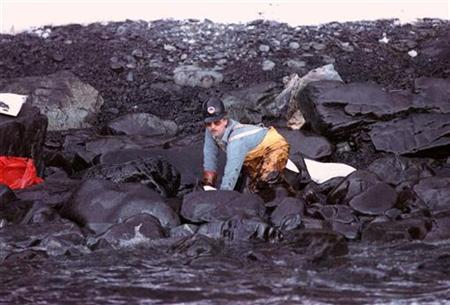Date: 25-Mar-09
Country: US
Author: Yereth Rosen
Twenty Years After Valdez Spill, Exxon Grows In Alaska Photo: Mike Blake

On his hands and knees, a member of the cealn up crew scrubs the oil soaked rocks on Naked Island in the Prince William Sound, April 2, 1989 after the worst oil spill in U.S. history, cased by the Exxon tanker Valdez.
Photo: Mike Blake
ANCHORAGE - Twenty years ago, when crude oil was gushing out of the wrecked
Exxon Valdez supertanker and Prince William Sound was being blackened by
what would become the nation's worst tanker spill, oil giant Exxon Corp was
vilified in Alaska.
Bumper stickers said the corporation's name was the "sign of the
double-cross." A sarcastic T-shirt took jabs at the company's perceived
arrogance, proclaiming: "Exxon: We Don't Care. We Don't Have to Care."
Today, Exxon Mobil Corp, as the company is now known, is expanding in Alaska
and officials are striking a conciliatory tone about the tanker disaster
that has defined the company in Alaska and much of the world.
"The event around Valdez, you can't overstate how tragic it was and how it
was such a low point for the company in our 125-year history," said company
spokesman Alan Jeffers. "We understand the feelings of the people of Alaska
about the spill itself and the continuing impact that it had and recognize
how difficult it was."
As economic malaise forces other oil companies to cut back, delay projects
and lay off employees, Exxon has embarked on this season's biggest new
project in Alaska's petroleum-rich North Slope region -- a 50-mile
(80-kilometre) ice road, and a two-well drilling program at the long-dormant
Point Thomson field.
The company has put over 250 employees and contract workers on duty at Point
Thomson, despite a legal dispute in which the state is trying to revoke
leases for nonperformance.
Exxon has tripled its Anchorage office space, said Craig Haymes, the
company's Alaska production manager. It is actively examining options for a
massive natural gas pipeline, he said.
And it has boosted its community contributions. This year, Exxon became one
of the four prime sponsors of the Iditarod Trail Sled Dog Race, ponying up
$1.25 million over five years.
This is all part of a move into a higher-profile role as an oil-field
operator rather than a mere investor in the North Slope's Prudhoe Bay and
other properties operated by other oil companies such as BP Plc or
ConocoPhillips, according to Exxon officials.
"We've been in Alaska for 50 years. We'll be here for another 50 years,"
Haymes said.
DAMAGE REMAINS
But with still-pungent oil lingering on some beaches, Prince William Sound
herring stocks nearly wiped out by an epidemic that fishermen believe was
triggered by the spill, various animal populations depleted and residents
exhausted by long years of still-unresolved litigation, many Alaskans are
still bitter.
A June 25 U.S. Supreme Court decision, which shrank a punitive award that
had originally been $5 billion to a mere $507.5 million, was devastating to
fishermen, Alaska Natives and other spill litigants. Meanwhile, Exxon is
prospering, with more than $30 billion in cash on its balance sheet.
"Exxon is very, very healthy, unlike Prince William Sound," said state
Senator Hollis French, an Anchorage Democrat. "I think Alaskans for several
generations will have a bad taste in their mouths from that incident."
Some political experts say lingering anger at Exxon has been reflected in
state policy.
A year ago, Governor Sarah Palin suggested Exxon was unwanted as a partner
in a long-desired but as-yet-unbuilt North Slope natural gas pipeline.
"The sentiment shared by a lot of Alaskans is, you know, Exxon, don't let
the door hit you in the stern on your way out if you choose not to
participate in progressing development of Alaska's resources," Palin said at
a news conference a year ago.
Alaska's Natural Resources Commissioner Tom Irwin, who has been in the
forefront of the battle to revoke Point Thomson leases so that they can be
sold to other companies, once issued a statement saying he "did not trust"
Exxon to follow through with its promises.
Still, French said, if Exxon is trying to improve its operations and make
more contributions to Alaska's economy and nonprofit organizations, the move
should be welcomed.
"They shouldn't be punished or excoriated for that," he said.
(Editing by Bill Rigby and Marguerita Choy)
© Thomson Reuters 2009 All rights reserved
